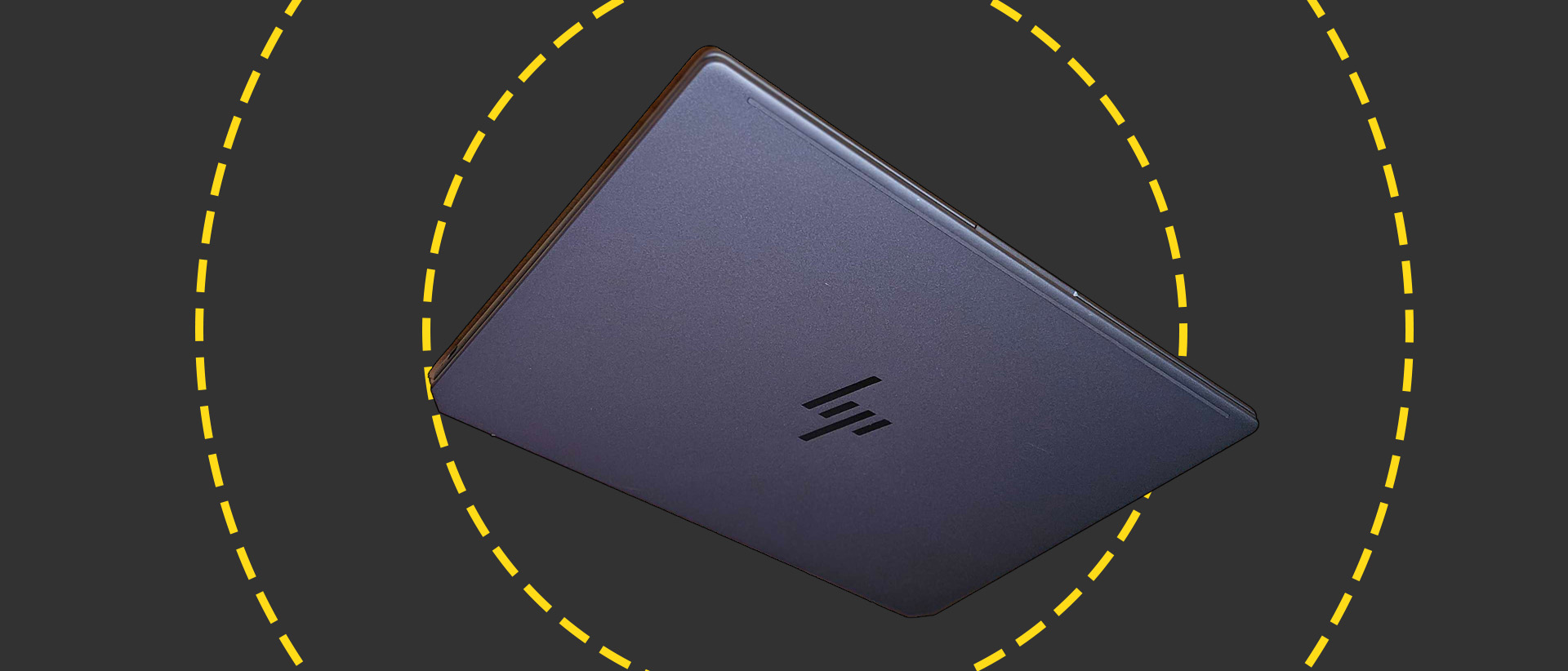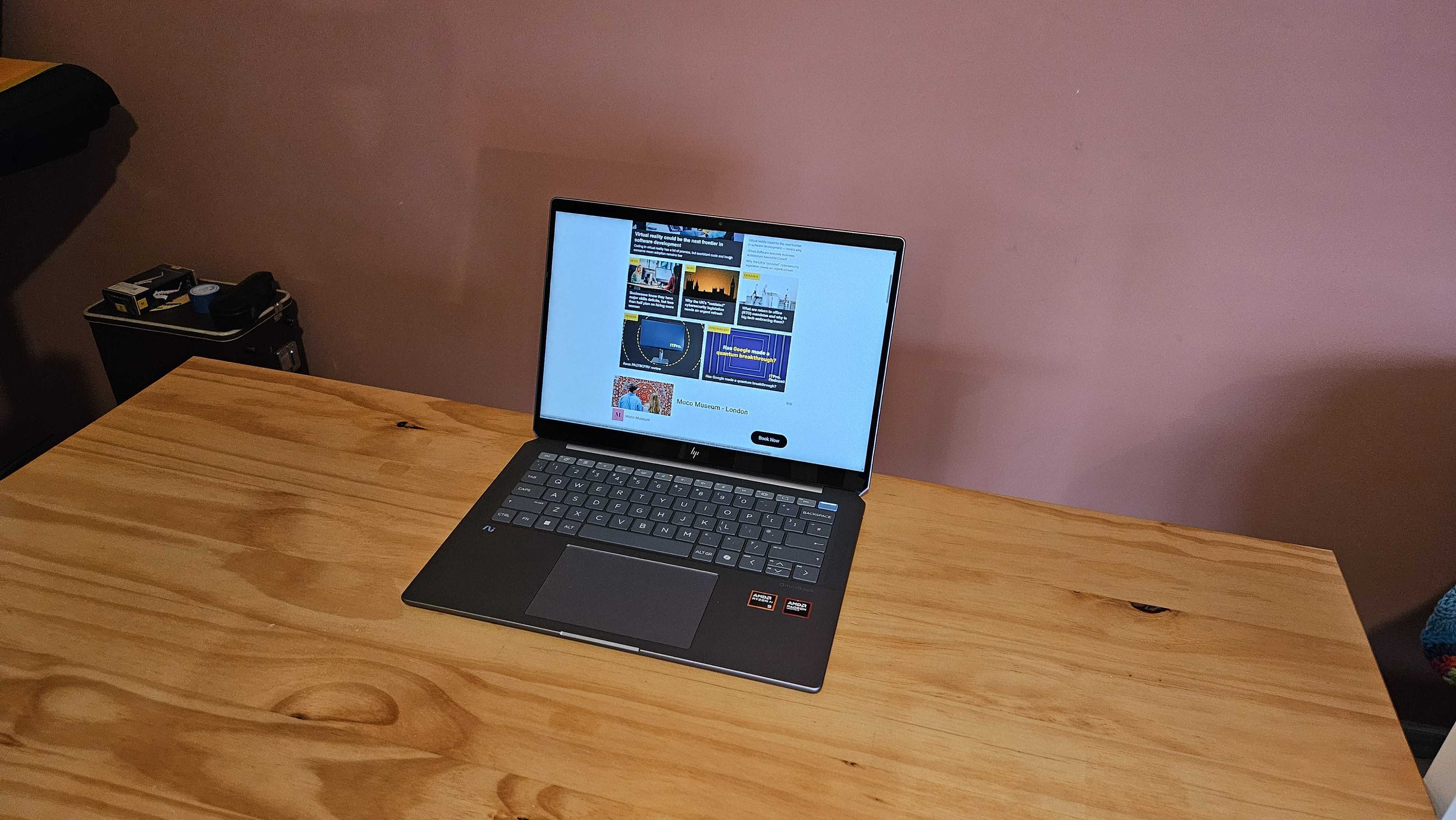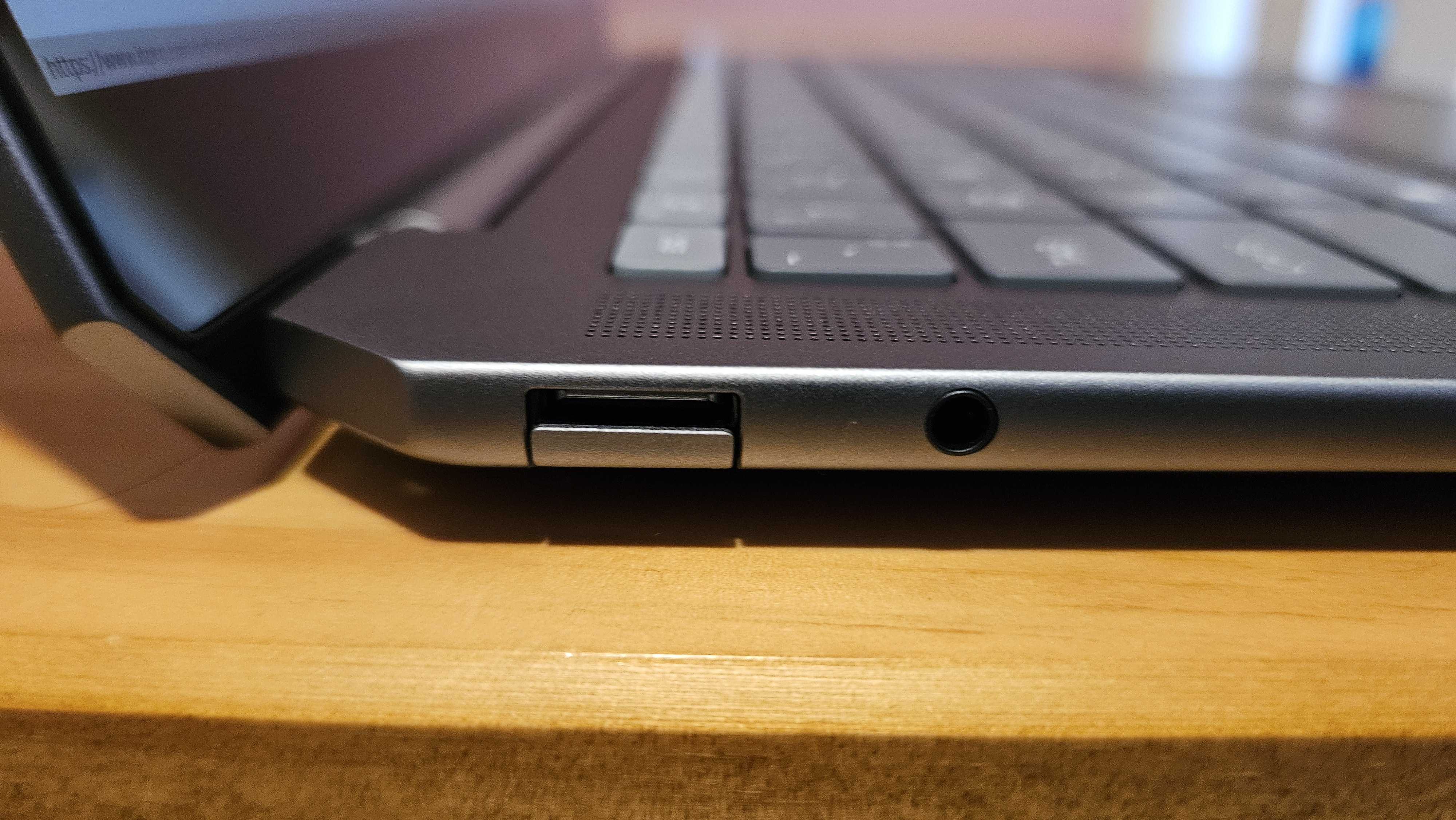HP OmniBook Ultra 14 review: Turbocharged laptop with a lackluster screen
This laptop is everything you want under the hood for a fantastic price – it's just a shame it's let down by its display

-
+
Exceptional performance
-
+
Great value for money
-
+
Top keyboard
-
+
Good battery life
-
-
Dim display
-
-
Tad heavier than similar machines

You may be forgiven for feeling a little dizzy examining HP's portfolio of laptops in 2024 – with a flurry of machines pre-consolidation and post-consolidation saturating the market at once. In July, HP scrapped the Dragonfly, Spectre, and Envy brands and replaced them with its flagship enterprise device, the EliteBook Ultra G1q, and this machine – the HP OmniBook Ultra 14 – which ITPro described on its launch as "the most powerful AI PC available on the market".
That's a big claim – but if you peer beneath the bonnet you can see why. A high-power AMD CPU coupled with a great graphics chip, not to mention 32 GB RAM and an NPU that can hit 50 TOPS – slightly more than comparable devices. The best part of the HP OmniBook Ultra 14, however, is its price. With plenty of AI-infused enterprise machines, including the aforementioned EliteBook, retailing closer to the $2,000 mark (or even higher if you look at some manufacturers), this model is available for much less – and can often be found on sale for nearer $1,000.
HP OmniBook Ultra 14: Design and display
The HP OmniBook Ultra follows a similar design scheme to the HP Spectre x360 with its shaved angular corners that do give it an aesthetic edge over the traditional rounded corner design most notebooks adopt. The chassis itself is incredibly similar to its predecessors in terms of its strong build quality and robustness.
Where it falls short is that, despite being about as weighty as a MacBook Pro, it's heavier than other similarly sized machines. It's 0.4lbs (0.2kg) heavier than the aforementioned Spectre, which weighed 3.09lbs (1.44kg), as well as machines like the Lenovo ThinkPad T14s Gen 6, which weighed 2.72lbs (1.24kg) – so we wouldn't recommend it if you wanted the lightest possible machine out there with a 14-inch screen size. Its dimensions too are fairly compact but it looks and feels chunkier than you'd like. For a razor-thin machine, you're better off looking at the MacBook Air or even its cousin, the HP EliteBook Ultra 14 G1q.
Unfortunately, its display is a massive disappointment – while it looks sharp to the naked eye, and isn't unenjoyable to use, it's also very dim. Every now and then, we subconsciously and repeatedly tried to hit the 'increase brightness' button before realizing we had already maxed it out. We confirmed this in our testing – registering a dim 263 cd/m2, which is shy of what you would expect from other machines. The HP Envy x360 2-in-1 hit 360 cd/m2, for reference, while you could expect a dazzling 535 cd/m2 from the Microsoft Surface Pro 11. This story continued when we measured other metrics such as color accuracy – with 94.8% coverage of the sRGB spectrum being a poor result by today's standards. In the last year, no machine we tested dipped below 98%. A black level of 0.39 cd/m2 is also a little high – and a contrast ratio of 779:1 is another poor result. That said, again, it's not bad to use – it's just a little dim. We would still recommend this machine if you are not working with media.

HP OmniBook Ultra 14: Performance and battery life
Power is what you came here for – and the HP OmniBook Ultra 14 does not disappoint. The 10-core AMD Ryzen AI 9 365 is paired with an AMD Radeon 880M Graphics chip and an integrated 50-TOPS NPU to offer the best performance you will get from a Windows machine at this price point. We are primarily comparing this configuration with the Qualcomm Snapdragon set-up you would get in some of the most powerful Windows machines today – and overall, it's a step up thanks to that graphical boost you get with the AMD GPU. It's also worth noting that Intel is set to release its latest Core Ultra series chips, but we have not had a chance to compare the Arm-based and AMD chips with it.
When we tested the machine using Geekbench 6, we registered a single-threaded performance score of 2,810 – which is the highest of any Windows machine we've tested lately. The next highest score was achieved by the Qualcomm-powered Lenovo ThinkPad T14s Gen 6 (2,448). It's the closest machine to the MacBook Pro M4's 3,855 for single-threaded performance, based on publicly available data. Multi-threaded was about in line with other machines, with Apple's M4 processor scoring 14,888 – and other Snapdragon machines usually falling in the 13,000 to 15,000 range. The HP OmniBook Ultra 14 fell in line with this, with a good result of 14,153. Its GPU performance, however, blows the rest of the Windows competition out of the water, thanks to the AMD Radeon GPU – with a score of 33,349 not quite hitting the M4's 37,508 – but nearly 10,000 points higher than the best entry-level GPU we've tested, the Intel Arc Graphics chip fitted into the HP Spectre x360 14. Qualcomm's entry-level graphics chips usually hit around 20,000 in this test.
It's also worth noting this machine has one of the fastest SSDs you can get in a laptop – with 7,163 MB/s read speeds and 6,502 MB/s for writes – ideal if you find yourself regularly copying over large files. Also excellent is a battery life of 16hrs 14mins. It's not quite the 22hrs HP claims, but it's on the higher end of results we've seen, thanks in part to the way the 50-TOPS NPU optimizes workloads.
HP OmniBook Ultra 14: Features
The HP's pastel-hued keyboard is snappy and responsive and perfectly fine to use – with the usual caveat you get with HP keyboards (the half-sized Enter key). It's initially quite enjoyable to use but if we can make any criticism, it's that the travel distance with each key push feels too short – and there's an element of resistance that can make typing for longer durations perhaps a bit toiling. There's little criticism we can make of the glass-coated touchpad at first, which is perfectly sized. However, we experienced a minor responsiveness issue while holding and dragging. Every now and then, it doesn't 'stick' and you can find yourself dropping things you're dragging, like windows or browser tabs.
Unlike a few other enterprise machines, you don't get an HDMI port with the HP OmniBook Ultra 14 – and you also get one USB-A port, besides a 3.5mm headphone jack. This comes alongside two USB-C ports (one in the angular corner and the other on the right-hand side of the chassis). The lack of HDMI is perhaps forgivable given the prominence of USB-C as a video output, but it's nice to have options – and the thinner Lenovo machines do manage to make room for it. On the flipside, you get the latest wireless standards including Wi-Fi 7 compatibility and Bluetooth 5.4.

You also get the typical package of HP software-based tools, including the new HP AI Companion – an onboard app that you can interact with using natural language to manage and maintain your machine. Poly Camera Pro can also help you boost your video conferencing experience when you use the excellent 9MP webcam by implementing consistent features across various apps, while Enhanced Lighting gives you more options when you're in dimly lit conditions. Presence sensing is also a useful feature that you can use to ensure your laptop locks while you walk away, or your screen dims while your attention is elsewhere to conserve battery.
HP OmniBook Ultra 14: Is it worth it?
HP's most powerful AI PC certainly lives up to expectations. The machine is as well-built as you would expect if not too weighty and a bit chunky. But where it really shines is its blistering performance and lengthy battery life thanks to the AMD hardware built into it, and graphics performance approaching the MacBook Pro. It's just a huge shame, then, that it's let down by a really disappointing display. There's nothing glaringly wrong with it to the naked eye, but colors are not as accurate as other machines and it's way too dim. We are disappointed the machine wasn't built with an OLED display or even just a bright LCD screen – it would have made this laptop near-perfect and impossible not to recommend. Right now, though, you should consider it, but only if you don't really need to work with any media. It still excels in every other department and represents excellent value for money.
HP OmniBook Ultra 14: Specifications
| Processor | AMD Ryzen™ AI 9 365 (10 cores) | Row 0 - Cell 2 |
| RAM | 32 GB LPDDR5x | Row 1 - Cell 2 |
| Graphics card | AMD Radeon 880M Graphics | Row 2 - Cell 2 |
| Storage | 1 TB SSD | Row 3 - Cell 2 |
| Display | 14in IPS HDR Touch screen, 2,240 x 1,400 | Row 4 - Cell 2 |
| Ports | USB-C, USB-A, 3.5mm Headphone jack | Row 5 - Cell 2 |
| Connectivity | MediaTek Wi-Fi 7 MT7925 (2x2), Bluetooth 5.4 | Row 6 - Cell 2 |
| Operating system | Windows 11 Home | Row 7 - Cell 2 |
| Dimensions (WDH) | 8.96 x 12.41 x 0.65 in (227.6 x 315.1 x 16.4 mm) | Row 8 - Cell 2 |
| Weight | 1.57 kg | Row 9 - Cell 2 |
| Battery capacity (Wh) | 68 Wh | Row 10 - Cell 2 |
Get the ITPro daily newsletter
Sign up today and you will receive a free copy of our Future Focus 2025 report - the leading guidance on AI, cybersecurity and other IT challenges as per 700+ senior executives

Keumars Afifi-Sabet is a writer and editor that specialises in public sector, cyber security, and cloud computing. He first joined ITPro as a staff writer in April 2018 and eventually became its Features Editor. Although a regular contributor to other tech sites in the past, these days you will find Keumars on LiveScience, where he runs its Technology section.
-
 ‘Phishing kits are a force multiplier': Cheap cyber crime kits can be bought on the dark web for less than $25 – and experts warn it’s lowering the barrier of entry for amateur hackers
‘Phishing kits are a force multiplier': Cheap cyber crime kits can be bought on the dark web for less than $25 – and experts warn it’s lowering the barrier of entry for amateur hackersNews Research from NordVPN shows phishing kits are now widely available on the dark web and via messaging apps like Telegram, and are often selling for less than $25.
By Emma Woollacott Published
-
 Redis unveils new tools for developers working on AI applications
Redis unveils new tools for developers working on AI applicationsNews Redis has announced new tools aimed at making it easier for AI developers to build applications and optimize large language model (LLM) outputs.
By Ross Kelly Published
-
 Google layoffs continue with "hundreds" cut from Chrome, Android, and Pixel teams
Google layoffs continue with "hundreds" cut from Chrome, Android, and Pixel teamsNews The tech giant's efficiency drive enters a third year with devices teams the latest target
By Bobby Hellard Published